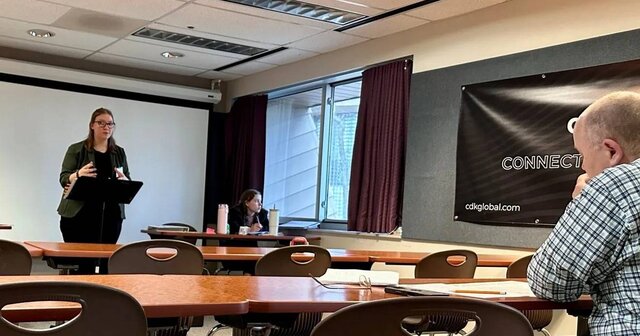
This article originally appeared in The Detroit News April 16 2025.
MIDLAND — A young woman dressed in a professional business outfit shook my hand and introduced herself.
“Hello, I’m Claire, your first affirmative speaker.”
“I’m Ethan, the second affirmative speaker,” said her partner, with a firm handshake.
Claire and Ethan were joined by another team, Megan and Scott (names all changed). Over the next 80 minutes, I watched a masterclass of civil debate and disagreement as they tackled the radioactive topic of election reform.
What I witnessed was both impressive and instructive.
More than 40 high school debate teams gathered this past weekend at Northwood University in Midland. The two-day event drew teams from four states. Nearly 150 people from the community showed up to judge speech and debate competitions: business leaders, grandparents, Northwood professors, pastors, lawyers and local elected officials, including two mayors. With two children participating, I was there to help out.
The debate resolution was broad: “Resolved, The United States Federal Government should reform its policy for the administration of federal elections.”
A round of debate — each team completed seven rounds — followed a rigorous format. The affirmative team proposed a plan to accomplish the resolution, with clear policy changes and measurable advantages. The negative team then pummeled the plan with objections: Why should we care about this problem? Will your plan fix it? Or will the problem take care of itself? Each team cited experts in support of their arguments, swatting statistics back and forth like a ping pong match.
David Furlough is an assistant debate coach who lives near Dayton, Ohio. He said many people struggle to speak in front of others.
“The first and fundamental skill we’re teaching here is how to speak, how to communicate your ideas,” he told me.
Furlough participated in debate as a high school student. He credits it with his ability to work in a technical field. “The biggest benefit for me was the ability to synthesize an idea and communicate it in a multitude of different ways,” he said.
In addition to speaking skills, debate participants gain a civic education. The statistics on civic awareness are abysmal. In a study the U.S. Chamber of Commerce conducted in 2024, more than 70% of Americans failed a civic literacy quiz, with basic questions about our system of government. Only half of respondents correctly identified the Legislature as the branch that passes laws. The 2024 Annenberg Constitution Day Civics Survey found that fewer than a third of Americans could name three or more of the rights enshrined in the First Amendment. Twenty percent of respondents could not name a single right.
Meanwhile, debate students must study how elections work so they can argue convincingly. Should Congress change voter registration requirements? Should states require photo identification to vote? How do cybersecurity concerns affect election data management? A successful debate participant will have considered these questions and many more.
The guest judges I spoke with expressed amazement that high schoolers could master such a complex subject and then argue with grace and goodwill.
At the end of their round, Claire, Ethan, Megan and Scott all shook hands and thanked me for judging. Watching the competitors, I wondered: Is this a positive sign for the future or a dying art?
Recent tensions — like the backlash against Gov. Gretchen Whitmer for simply meeting with President Donald Trump last week — suggest civility and bipartisanship are becoming political liabilities. But considering the reality of divided government in Michigan, how else will we tackle the big problems?
Permission to reprint this blog post in whole or in part is hereby granted, provided that the author (or authors) and the Mackinac Center for Public Policy are properly cited.
Get insightful commentary and the most reliable research on Michigan issues sent straight to your inbox.

The Mackinac Center for Public Policy is a nonprofit research and educational institute that advances the principles of free markets and limited government. Through our research and education programs, we challenge government overreach and advocate for a free-market approach to public policy that frees people to realize their potential and dreams.
Please consider contributing to our work to advance a freer and more prosperous state.

Donate | About | Blog | Pressroom | Publications | Careers | Site Map | Email Signup | Contact